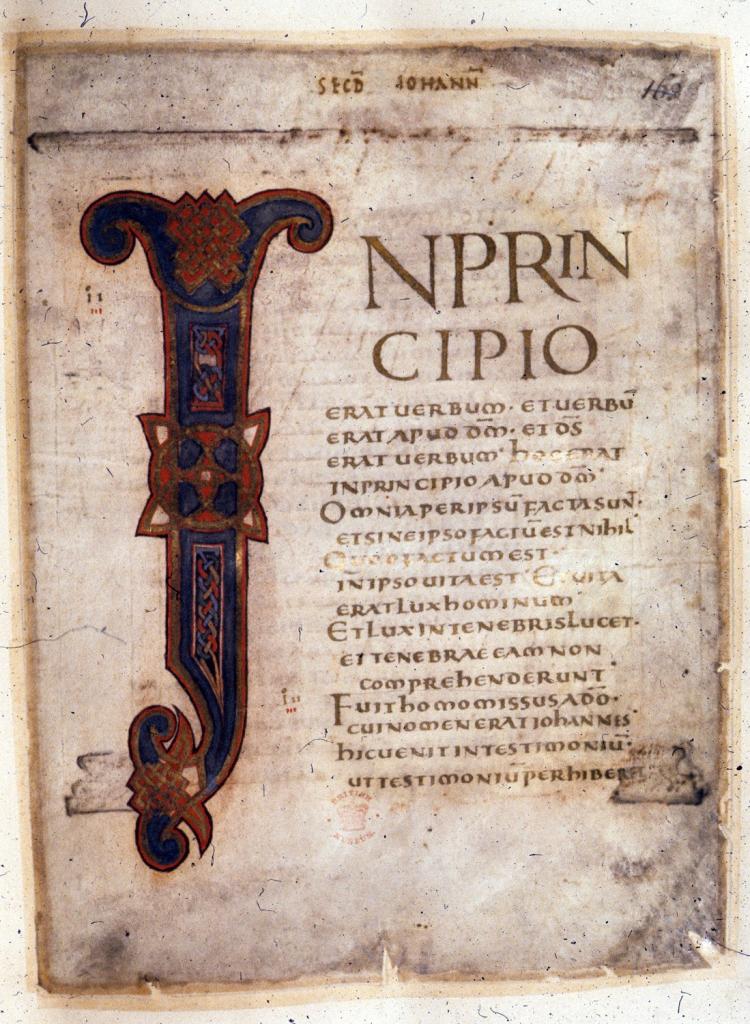Over the Christmas season, our churches will be reading the magnificent Prologue to John’s Gospel, which is the foundation of so much of the Christian theology of Incarnation. This tells of the Light, and how “The light shines in the darkness, and the darkness has not overcome it” (1.5 RSV, also NIV) or alternatively, “the light shineth in darkness; and the darkness comprehended it not” (KJV). Overcome and comprehended – aren’t those radically different words? Is one wrong? Why do we have such different translations? Actually, each is correct in its way, and the process of determining the right word is a significant exercise in translation, and in deciding authorial intent. The story tells us a great deal about the thought world of those earliest Christians.
Here is the Greek original:
καὶ τὸ φῶς ἐν τῇ σκοτίᾳ φαίνει, καὶ ἡ σκοτία αὐτὸ οὐ κατέλαβεν.
Kai to phos en te skotia phainei, kai he skotia auto ou katelaben.
The obvious parallel here is Genesis 1, on which the Prologue is a kind of meditation, and specifically God’s separating the light from the darkness. But depending on how we translate that key word katelaben, there are wider implications. We hear that the Darkness (skotia) has not “overcome” it. But why would it want to do that? Are we meant to assume a fundamental conflict between Light and Darkness, a kind of Dualist cosmic warfare? Do Light and Darkness battle until one overcomes the other? How active or individualized a principle is Darkness? Does Darkness imply Satan? Or is it just the material creation? Should we capitalize Darkness, or The Darkness, or are we just talking about generic darkness?
Or if it is “comprehended,” does that envisage the creation as some kind of lumbering ignorant beast, unable to understand the glory that suddenly descends upon it? The Latin Vulgate read the word as “comprehend”: et lux in tenebris lucet, et tenebrae eam non comprehenderunt. That actually is powerful testimony to how the text was read in the early church, if not necessarily what the author intended. Through the Vulgate, that remained the standard reading for Catholics right up to very modern times, and those Catholics have always represented a numerical majority of the world’s Christian believers. Luther read it as “understood,” begriffen, and that is the usual translation in later German versions.
But again, to say that X comprehends Y, or fails to do so, we are ascribing a mind to that entity or being. You can’t say that a tree or a wall comprehends or understands anything. Again, is Darkness a force or even a sentient being, rather than a quality of nature, or a metaphor? Either way, this line hints at a whole cosmology.
I won’t go into this too much here, but darkness appears as the home of evil in the Dead Sea Scrolls, and in related texts like the Testaments of the Twelve Patriarchs. Of Belial, we hear that “all his deeds are darkness, and he dwells in darkness.” In the Testament of Levi, Levi urges his children to “choose therefore for yourselves either the darkness or the light, either the law of the Lord or the works of Beliar.” If not outright Dualism, these texts are certainly pushing in that direction. That is even more apparent if we write it as “either the Darkness or the Light,” as we are free to do if we choose.
How, then, do we decide which meaning is intended in John’s Prologue? Overcome or understood?
Go back to that key word katelaben (overcome/comprehended), which is from the verb katalambanó, and it is translated very differently in various parts of the New Testament. Sometimes it definitely means to seize or grab, to lay hold of, possibly in a demonic context. In Mark 9.18, a dumb spirit possesses a boy, and sometimes it seizes him. In John 12, Jesus tells his disciples to “walk while you have the light, lest the darkness overtake you.”
In John 8, it is used for the woman taken in adultery (γυναικα εν μοιχεια κατειλημμενην), and that example illustrates my point. The woman was assuredly not comprehended in adultery: she might have been seized, or taken, or caught. And to say that definitely means that some person, or at least some conscious entity, was responsible for seizing or taking or catching her.
Outside the gospels, katelaben occurs ten times in the New Testament, but each time it suggests “taking” in the figurative sense of taking in, or understanding, rather than physical grabbing. In Classical Greek, including Plato, the word often carries this sense of “to lay hold of with the mind.” When Peter extends the gospel to the Gentiles in Acts 10, he reports how he now understood or perceived that God shows no partiality between Jews and Gentiles. In Acts 25, Festus reports that he had investigated Paul, and found that he was not a criminal deserving death.
Yes, that’s all one Greek verb.
Generally, I favor the comprehended/understood reading of John 1.5. Having said that, I do admit that in the same gospel, 12.35 combines the words darkness and katalabe in a context that definitely means something like overtaken or comes upon you. Evidently, Jesus is not warning of the danger that darkness might understand you. That overtaken reading would also fit the cultural context that we know from the sectarian Judaism of the time, and the world of Qumran.
Or might the original author consciously have intended multiple interpretations? Let me offer an alternative translation. In English, as in Greek, a couple of words cover both meanings. One is apprehend, which can mean to understand a truth, or to arrest a thief (or an adulterous woman), but “apprehend” sounds a bit remote and technical – too formal. Another word that might work is “catch” (Did you catch what he said? Do you catch my drift?)
Or, there is a perfect word in standard spoken language, neither too formal nor too casual, and that is to grasp. I grasp your meaning; a robber grasped him; beware lest the darkness grasp you. Depending on the circumstances, the word might suggest both meanings at the same time, literal and figurative. (Luther’s begriffen has something of the same effect).
Suppose we translated John 1.5 as “The light shines in the darkness, and the darkness has not grasped it.” That offers the sense of evil forces grasping to prevent liberation, but also indicates incomprehension. They just don’t grasp what they are dealing with here! Can we properly claim that the evangelist is deliberately offering an ambiguous reading, in the way that so often appears in his gospel? If nothing else, that has the virtue of deciding not to decide.
Having said all that, I have problems with the “overcome” word, because that does imply some kind of overwhelming final victory, which is not what I read into the less final “seize” or “take.” But I stand ready to be corrected.
Now imagine you have to make decisions like that for every single word in the New Testament, and you will understand the pitfalls facing any and all translators. Whatever they are paid, it’s not enough.
I hope you grasp my point.














